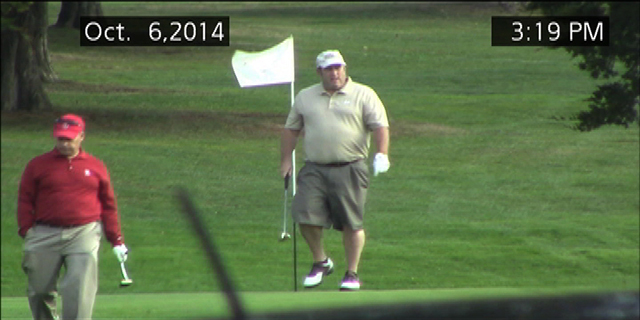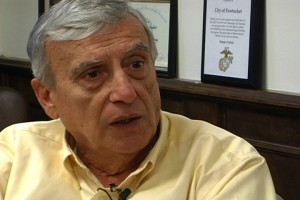Editor’s note: A year ago The Hummel Report unveiled the results of a four-month undercover investigation that showed a Pawtucket Police major spending his work days on the golf course or at home. On November 30, facing a potential demotion, he decided after 30 years to retire.
Our investigation found that Major Bruce Moreau, who oversaw the patrol division, spent days at his house in Lincoln, his parents’ house in Pawtucket, or playing golf on various courses miles from headquarters when he was supposed to be working.
Since our story first ran many have asked: What is the city doing in reaction to our investigation, after state police determined there was not enough evidence to bring criminal charges against the 30-year veteran of the department?
Mayor Donald Grebien has said repeatedly that state law does not allow him to comment about whether his administration was seeking departmental charges against the major. But The Hummel Report learned the city was going full steam ahead with a Law Enforcement Officers Bill of Rights hearing and Moreau could face being demoted, which would affect his pension, or terminated, depending on the outcome of the hearing.
 “I think he realized the time had come for him to leave,’’ Pawtucket’s Public Safety Director Antonio Pires told us during an interview the day after Moreau retired. Pires would not elaborate, again citing the officers Bill of Rights. So we asked why it took so long.
“I think he realized the time had come for him to leave,’’ Pawtucket’s Public Safety Director Antonio Pires told us during an interview the day after Moreau retired. Pires would not elaborate, again citing the officers Bill of Rights. So we asked why it took so long.
“It’s a difficult process,’’ Pires said. “We were originally criticized, folks said he should be suspended and sent home. That’s just against my DNA. I can’t send someone home and have them sit at home while they’re getting paid. The irony of that, of course, is that’s what got the individual in trouble in the first place.’’
By leaving now, Moreau will soon begin collecting a pension that is 70% of his final pay. That translates to $5,750 a month, or $69,00 year. By contract he is also collecting a lump sum paycheck of more than $70,000 for unused sick and vacation time and other assorted items.
We learned that one of the reasons state police did not file criminal charges is because the city’s record-keeping system was so abysmal.
Jim Hummel (Motif): Our story showed numerous instances where the major was not at the station, but on the golf course, his parents’ house or his house, on days where the records you provided us indicated that he was at the station. It didn’t rise to a criminal charge because of some problems on the city’s end, in terms of loose …
Antonio Pires: … record keeping and policies and procedures. The concern here was the record keeping didn’t give us or the state police the ability to go forward with a criminal investigation or an indictment because some of those records were not adequate.
Pires says a new system should be fully up and running by mid-February.
JH: If that system had been in place a year ago, would we be looking at a potentially different outcome?
AP: I think so. I think it would have been more difficult to bypass the system. That was one of the issues, and certainly the record keeping would have been much stronger. There would have been a basis of stronger evidence in regard to any other investigations.
Our investigation also showed Moreau using his city-issued car for personal trips, violating a city ordinance.
JH: Has that caused you to revisit the policy or to tighten it up?
AP: We’re concerned about that every day. There’s a reminder, whether it be police or Department of Public Works, etc., we’ve tried to do the best we can to tighten that up.
JH: Was he ever disciplined for that?
AP: I don’t want to get into any specifics with regard to that. I think ultimately the issue you brought forward, and the city is grateful for that, is that was an element of grave concern, especially with somebody of that high a position. It’s not really what you want to see your command staff doing because they’re supposed to lead by example.
Pires says the administration is still considering implementing a GPS system for all city vehicles that was approved by the city council earlier, adding that cost and logistics have made it a challenge so far to execute.
This is the first time Pires has spoken on camera about our original investigation.
JH: When you saw that report last year, what was your reaction?
AP: There’s a level of integrity, that if you have it, you don’t need GPS systems. You don’t need sophisticated record-keeping systems. You know what your responsibilities are and you fulfill them as an honorable human being. It’s really that simple.
The Hummel Report is a 501 3C non-profit organization that relies, in part, on your donations. If you have a story idea or want make a donation go to www.hummelreport.org, where you can also see the video version of this story. You can mail Jim directly at jim@hummelreport.org.

